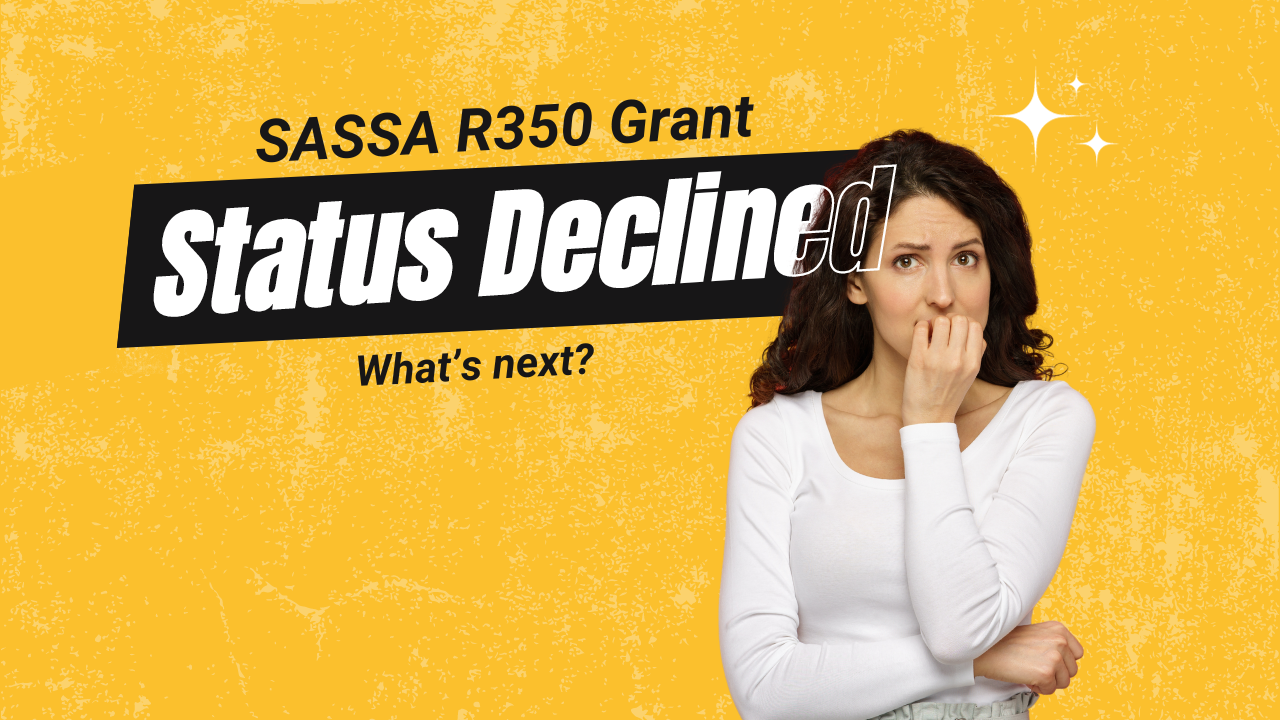SASSA R350 Grant Status Declined [Reasons]
Hurry up; your SASSA R350 grant status declined! Yes, you are the only one who stopped by a red light while others have already crossed. It is heartbreaking, and only you will be thinking, why me? Because you believe you have given the correct information.
But the reality is the opposite, yes! You are at fault. But fear not, as we are about to uncover the details and lift the curtains on your wrongdoings while making sure to make your successful way at SASSA! So hold the reigns of your horse, as we are the ones who will cross the finishing line first!
Let’s dive in!
Why was my SASSA R350 Grant Status Declined?
Now, first thing first, if your SASSA R350 grant status has been declined, it can be frustrating, but understanding the reasons behind it is crucial. Here’s a concise step-by-step explanation:
Eligibility Issues:
Your grant may be declined if you don’t meet the eligibility criteria, which include:
- South African citizenship or permanent residency.
- Unemployment.
- No other social grants or fixed income.
Documentation Errors:
- Errors or inconsistencies in your submitted documents can lead to a decline.
- Double-check your paperwork for accuracy.
Duplicate Applications:
- Submission of multiple applications can result in a declined status.
- Ensure you’ve submitted only one valid application.
Income Discrepancies:
If there are discrepancies in your income information, your status may be declined.
Make sure your income details align with your situation.
Bank Account Issues:
The bank account details provided during your application are incorrect or inactive. Ensure your banking information is accurate and up-to-date.
Verification Failures:
SASSA may encounter difficulties in verifying your identity or eligibility. It can happen if the
- The information you provided doesn’t match official records.
- If there are discrepancies in your details.
Late or Incomplete Documentation:
Submitting your application with missing or incomplete documents. Failing to provide requested information on time can result in a declined status.
Criminal Record:
In some cases, a criminal record that disqualifies you from receiving government grants may lead to a declined status.
Beneficiary Limit:
SASSA limits the number of beneficiaries per household who can receive grants. If you exceed this limit, your application may be declined.
Non-Compliance with Reporting Requirements:
Failure to comply with reporting or reapplication requirements, such as
Providing updated information when requested can result in a declined status.
NOTE
It’s crucial to carefully review your declined status notification to determine the reason for the decision. Addressing the issue promptly, whether it’s correcting errors in your application, providing missing information, or appealing the decision if you believe it was made in error, is the key to resolving the matter and securing the support y
Appeal for a SASSA Grant R350 Declined Status
You have the right to appeal when your grant status takes a hit. The appeals process is your opportunity to present your case and correct any misunderstandings.
Gather your evidence. The stronger your case, the better your chances of success. The appeals process is like a courtroom drama; you want to be the persuasive lawyer presenting an airtight case.
1. Understand the Reason for Decline:
Review the notification provided by SASSA to understand the specific reason your grant was declined. It’s crucial to know the cause to build a strong appeal.
2. Gather Supporting Documents:
Collect all relevant documentation that supports your eligibility for the grant. It might include your South African ID, unemployment proof, and other required documents.
3. Contact SASSA:
Reach out to SASSA as soon as possible to express your intention to appeal. You can do this through their helpline or by visiting your local SASSA office.
4. Complete an Appeal Form:
SASSA will provide you with an appeal form. Fill it out accurately, providing all requested information. Attach the supporting documents you’ve gathered.
5. Submit Your Appeal:
Once your appeal form is completed and the required documents are attached, submit them to the SASSA office. Ensure you keep a copy for your records.
6. Wait for a Response:
SASSA will review your appeal and respond. Be patient during this process, as it may take some time.
7. Follow Up:
If you have yet to receive a response within a reasonable timeframe, feel free to follow up with SASSA to inquire about the status of your appeal.
8. Provide Additional Information:
If SASSA requests more information or documentation during the appeal process, respond promptly to ensure a smooth resolution.
9. Stay Informed:
Keep track of the progress of your appeal and be prepared for any updates or further requests from SASSA.
10. Outcome:
Once your appeal is processed, SASSA will inform you of the outcome. If your appeal is successful, your grant status will be reinstated, and you’ll receive the financial assistance you need.
Remember that the appeal process is an opportunity to present your case and address any misunderstandings or errors. Be thorough, provide accurate information, and remain patient as SASSA reviews your appeal.
Conclusion
Challenges may seem like mountains, but they are opportunities to grow and learn. A declined SASSA R350 grant status is a hurdle, not a dead end. Understanding the reasons behind the decline, taking steps to resolve common issues, walking through the appeals process, seeking assistance, and staying informed can turn this setback into a triumph.
So, follow the mentioned steps and guidance according to command to ensure you’ll have a grant at your doorstep. Stay motivated!


One Comment